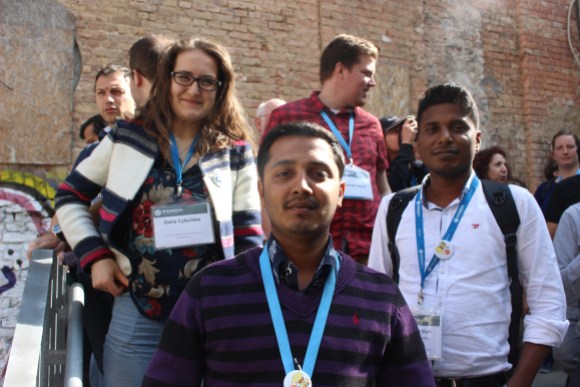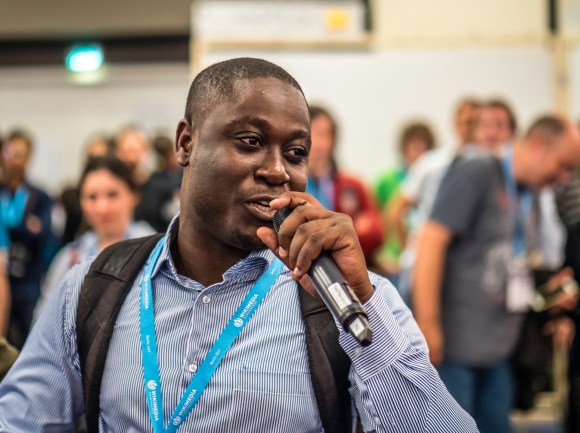The Wikimedia movement is currently engaged in a strategy process aiming to identify a shared direction across the movement. What do we want to build or achieve together over the next 15 years? That’s the big question that we’re collectively trying to answer using research and through community discussions. It’s easy to get lost in the jargon and the complexity of this ambitious process. This post aims to provide a high-level overview of what has been done so far and what to expect next.
———
First, I would like to take a moment to think back about what we’ve done over the past 16 years. We started from basically nothing in 2001. Now, Wikimedia sites are among the most visited in the world. We’ve written, compiled, and curated an amazing body of free knowledge including millions of articles, millions of media files, and wikis in hundreds of languages.
We’ve become a community of hundreds of thousands of people working together on “building monuments to other people’s knowledge“, as someone put it during a discussion about the values. It’s easy to focus on the day-to-day routine and lose sight of the impact that we have had on the world, but what we’ve achieved so far is truly remarkable.
Imagining the future
As we reflect back on what we’ve accomplished, we can also ask ourselves: What more can we do? What else should we do in the next 16 years? And so we’ve started thinking about what we want to have done by 2030, because 2030 is a round number and we as humans tend to like round numbers. Thinking about our future is an exercise in imagination, but we’re Wikimedians, so it’s an exercise in imagination based on facts, trends, and sources.
What do we know about the world we’ll be living in in 2030? We know that there will be a lot more people in it, particularly in Asia and Africa. We know that technology will evolve dramatically, notably through mobile devices, rich media, messaging, and new interfaces. We know that it’s currently going to take about a hundred years for children in low-income countries to catch up to the education levels achieved in developed countries. And we know that there is a trend towards a centralization of the internet and a consolidation of power in the hands of a few giant companies, notably in the tech industry.

Bringing in new voices
As we’re looking at the trends to consider, we also need to go beyond what we know and who we know. Our vision, what we’re set to accomplish, requires that we realize that we’re not alone. We’re part of an ecosystem, and we need others. We need partners. Those voices will help define our future, because they’re part of it.
This work involves hundreds of interviews, small-group discussions (“salons”), research, and building relationships for future collaboration. The Foundation is notably partnering with Reboot in Indonesia and Brazil to conduct research that is complementary to what was done with the New Readers program in countries where Wikimedia isn’t as well known as what we’re used to. They will interview partners, subject matter experts, and conduct contextual inquiries with readers in their own environment using methods of design research. In parallel, online surveys are being conducted in the places where we are the most popular, to understand how people perceive and use Wikimedia.
This work will inform and complement community discussions with new voices that haven’t traditionally been included in strategy discussions, or that are not yet part of the movement. They can help us identify the global trends that I mentioned earlier as what we should be considering as we discuss our future. For example, scenario planning is going to help us better understand what the world will look like in 2030, notably in terms of demographics, technology, media consumption habits, access to knowledge, and policy.
Some of that has already happened, and it will continue over the next few months. The information will be posted on Meta as it comes in. If you have recommendations of experts and partners in your circles or geographies that would enrich this discussion, you’re welcome to suggest their names on Meta. But more importantly, you can reach out to them yourself. The Foundation can’t do this alone; we are a global and distributed movement, and local relationships are much more likely to bear fruit than a centralized approach. The Foundation has also reserved budget for affiliates who want to run small-group discussions with subject matter experts. If this is something that motivates you, you can contact me and I will direct you to the people who can provide some advice on how to proceed.
Community discussions
This research and outreach will continue to inform the community discussions, which have been going on the past few months. From the first sessions at the Foundation’s all-hands meeting, to on-wiki discussions, to workshops organized by affiliates, to the recent Wikimedia Conference in Berlin, our movement has been buzzing with activity.
When I talk about bringing in new voices, it’s not just about people outside the movement. It’s also about people within the movement who don’t traditionally participate in this kind of discussion. This is why 18 coordinators were contracted to organize and facilitate discussions in many languages, with support from the Foundation’s Community Engagement team. Volunteers and groups have also organized discussions with their communities and affiliates across wikis and off-wiki. This has encouraged many contributors to participate in the discussion by avoiding the “Not my wiki” syndrome.
Some of the processes in the past few years have been more guided, for example by asking for people’s thoughts on the role of mobile devices, and some participants felt too constrained. This time, the discussion started at an earlier stage from a mostly blank page, with a bigger question. It was about imagining the role of the movement and what we would have achieved by 2030.
Many participants enjoyed the freedom that this big question allowed, and contributed insightful responses, resulting in over 1800 statements collected from the various communities. For others, the question was too vague, and they felt that they needed more specific questions to be able to contribute constructively. That’s completely fine, and if that was your case, you will have opportunities to discuss specific topics in more details starting next week.

Emerging themes
Until more research comes in, we can take a look at some of the preliminary themes that have started to emerge from the community discussions. The coordinators and many volunteers have started to summarize the discussions to make them more accessible, and a more quantitative analysis will be posted on Meta for translation later this week.
These initial themes won’t be too much of a surprise if you’ve participated in the discussions or been around the movement for a little while. They relate to:
- collaboration, working together, and partnering with others;
- fostering a healthy and sustaining community;
- ensuring content quality, neutrality, and reliability;
- partnering with the education sector;
- serving emerging communities and building a global movement;
- ensuring that we stay relevant through innovation in technology and product;
- acknowledging and filling knowledge gaps and biases;
- organizations, governance and structures;
- languages, diversity, and inclusion;
- supporting new and experienced contributors;
- defending our values.
These are just preliminary and are likely to change as more research comes in and discussions happen. Some of them are less about imagining a future and more about how to get there. They may become more actionable later in the year when we start talking about roles, structures, and practical implications.
A closer look at the themes
Now, I’ve mentioned that not everyone feels comfortable with big questions about imagining the future, and that’s completely fine. People think in different ways. Some need the freedom to explore their thoughts based on a short prompt; others need to focus on more specific topics and issues to really be able to think about what they mean.
And that’s what we’re all going to start doing in about a week. Right now, the team is starting to organize all the information that has emerged so far and preparing deep discussions about the main topics. Maybe you’re really interested in content gaps and biases; or moving beyond the model of the western encyclopedia; or possible business models across the movement; or fostering a sustainable and healthy community. You will have the opportunity to research and discuss these topics in detail.
If you haven’t participated until now, or if you’ve felt that you didn’t have anything to contribute, I encourage you to look out for the topic discussions that will start in a week. Together, we will begin to make sense of all this information and organize it into something that describes the direction we are imagining for our movement.

Reach out if you have questions
I know it’s easy to get lost in the process and the jargon, so I want to extend an invitation to anyone who is confused or has questions about this project. No matter how busy anyone seems to be, there is time to answer your questions and hear your concerns. If you don’t reach out about what isn’t working for you, the team can’t adjust.
If you don’t know who to contact, you can email me and I’ll redirect you to the appropriate person. You can also book a slot directly in my calendar.
This is exciting
I want to finish by saying that this is about your future. It’s exciting. And if you’re not excited, be practical. What we decide collectively will impact your work, your priorities, your headcount. Maybe not in the next fiscal year, but it will have an impact down the line. Now is when you need to participate.
So take a look at the information currently on Meta; look out for an announcement next week to join the topic discussions; share relevant research; comment on other people’s analyses; participation can take many forms. Our future will be shaped by those who show up; I hope that you do.
Guillaume Paumier, Co-lead architect, Core strategy team
Wikimedia Foundation
Video (Commons, YouTube) by the Wikimedia Foundation, CC BY 3.0.

Can you help us translate this article?
In order for this article to reach as many people as possible we would like your help. Can you translate this article to get the message out?
Start translation